Peter MALONE
Saturday, 18 September 2021 19:33
Double Vision/ 2002
DOUBLE VISION
Taiwan, 2002, 113 minutes, Colour.
Tony Leung Kay- Fai, David Morse, Rene Liu, Brett Climo.
Directed by Chen Kuo- Fu.
A stylish Taiwanese production with American finance and Australian technical support. It is strongly Chinese in its plot, atmosphere and development but is quite accessible to and entertaining for Western audiences. Basically it is a police investigation thriller, the teaming of a Chinese officer (Tony Leung Kai-Fai) with an American (David Morse). Mysterious murders in Taipei lead to the uncovering of a Taoist cult that uses biotechnical developments to perform ritual killings in order to achieve immortality. While the American uses science, forensic evidence and logic, the Chinese is more open to mysterious and transcendent influences in the world. This is a superior production of its kind.
1. An entertaining co-production, Taiwan, United States, Australia? Its universal appeal?
2. The city of Taipei and its becoming a character in the film? The comparisons with the American sequences in Quantico and the FBI centre, the desert and the American prison? The musical score and songs?
3. The drama of the prologue, the mother giving birth, the stillborn baby, its eye and double vision, its being kept in the laboratories? The surviving girl, 17 years later, her story, wanting immortality and to be united with her mother and sister?
4. The approach of the FBI to cases about serial killers, forensic studies, evidence, science and explanations, analyses? Autopsies and information? Theories based on logic? The developments of technology?
5. The contrast with Chinese traditions, a world of spirits? The Taoist traditions, beliefs in ghosts, immortality, hells and condemnations of individuals to different kinds of hells? Leading to rituals and cults? Ghosts and supernatural presences? The interaction of this Chinese belief and approach to the scientific American approach?
6. The murders in Taipei and their mysterious nature, to evidence: the industrial boss and his being frozen, the politician's mistress and her being burnt in her apartment, the priest and his being disembowelled in his bed? The reasons for these people being murdered? The mystery and the link between them? The air-conditioning, the drugs produced, affecting the brain and different hallucinations? The Thai police and the press conference, their saying that the murders were heart attacks and ordinary?
7. Huang Huo- Tu and his background, the investigation into corruption, his cousin taking his daughter as hostage, his shooting him, the alienation from his wife, his daughter not speaking, his leaving home, staying at his office, playing chess, alone, Li as his friend, urging him to better things? The lack of co-operation with the other police? Working with Foreign Affairs? His arrest of the Filipino trader in workers?
8. The comparison with Kevin Richter and his background at the FBI, his lecture, smoking, genial attitude, his explanation of the profile and its being wrong compared with the reality? Anthony Wayland and his victims, strangled, smiling? Richter visiting him in prison, his final words, putting the cigarette into Kevin's hand? The mystery of his talk about immortality? Going to Taiwan, the hostile reception by the local police, meeting Huang, the broken car window and Huang's tension, the meetings, the seeming courtesy of the police, the translation, his going to the scene of the crime? Going to the air-conditioner, getting the evidence?
9. The continued investigation, going to the Professor of Taoism, getting the information about the talisman? The geniuses, their background, selling their business, building the temple within their modern skyscraper? The police going to the temple, the cult, the ritual murder? The raid and the massacre? Finding the girl, her wounds, taking her to hospital?
10. Huang and his wife, her sympathetic attitude towards her husband, yet wanting the divorce? The visits with their daughter? His anger, the meeting with Kevin, Kevin's advice to Huang, courtesy to his wife?
11. Kevin and the visit to the family after the investigation, the meal together? His telling his story to Huang? Watching the press conference on the television, his belief in science, that the case was closed? The horror of his death during the night?
12. The girl and her powers, Huang and its effect on him, going to the temple, confronting her, his dreams about his wife and child, the girl transforming into them? Threatening him? His shooting her?
13. His going to hospital, his being pronounced dead, his wife willing him to live, his daughter speaking?
14. A satisfying blend of Asian and Western styles of film-making? The use of the police genre? Science and mystery?
Taiwan, 2002, 113 minutes, Colour.
Tony Leung Kay- Fai, David Morse, Rene Liu, Brett Climo.
Directed by Chen Kuo- Fu.
A stylish Taiwanese production with American finance and Australian technical support. It is strongly Chinese in its plot, atmosphere and development but is quite accessible to and entertaining for Western audiences. Basically it is a police investigation thriller, the teaming of a Chinese officer (Tony Leung Kai-Fai) with an American (David Morse). Mysterious murders in Taipei lead to the uncovering of a Taoist cult that uses biotechnical developments to perform ritual killings in order to achieve immortality. While the American uses science, forensic evidence and logic, the Chinese is more open to mysterious and transcendent influences in the world. This is a superior production of its kind.
1. An entertaining co-production, Taiwan, United States, Australia? Its universal appeal?
2. The city of Taipei and its becoming a character in the film? The comparisons with the American sequences in Quantico and the FBI centre, the desert and the American prison? The musical score and songs?
3. The drama of the prologue, the mother giving birth, the stillborn baby, its eye and double vision, its being kept in the laboratories? The surviving girl, 17 years later, her story, wanting immortality and to be united with her mother and sister?
4. The approach of the FBI to cases about serial killers, forensic studies, evidence, science and explanations, analyses? Autopsies and information? Theories based on logic? The developments of technology?
5. The contrast with Chinese traditions, a world of spirits? The Taoist traditions, beliefs in ghosts, immortality, hells and condemnations of individuals to different kinds of hells? Leading to rituals and cults? Ghosts and supernatural presences? The interaction of this Chinese belief and approach to the scientific American approach?
6. The murders in Taipei and their mysterious nature, to evidence: the industrial boss and his being frozen, the politician's mistress and her being burnt in her apartment, the priest and his being disembowelled in his bed? The reasons for these people being murdered? The mystery and the link between them? The air-conditioning, the drugs produced, affecting the brain and different hallucinations? The Thai police and the press conference, their saying that the murders were heart attacks and ordinary?
7. Huang Huo- Tu and his background, the investigation into corruption, his cousin taking his daughter as hostage, his shooting him, the alienation from his wife, his daughter not speaking, his leaving home, staying at his office, playing chess, alone, Li as his friend, urging him to better things? The lack of co-operation with the other police? Working with Foreign Affairs? His arrest of the Filipino trader in workers?
8. The comparison with Kevin Richter and his background at the FBI, his lecture, smoking, genial attitude, his explanation of the profile and its being wrong compared with the reality? Anthony Wayland and his victims, strangled, smiling? Richter visiting him in prison, his final words, putting the cigarette into Kevin's hand? The mystery of his talk about immortality? Going to Taiwan, the hostile reception by the local police, meeting Huang, the broken car window and Huang's tension, the meetings, the seeming courtesy of the police, the translation, his going to the scene of the crime? Going to the air-conditioner, getting the evidence?
9. The continued investigation, going to the Professor of Taoism, getting the information about the talisman? The geniuses, their background, selling their business, building the temple within their modern skyscraper? The police going to the temple, the cult, the ritual murder? The raid and the massacre? Finding the girl, her wounds, taking her to hospital?
10. Huang and his wife, her sympathetic attitude towards her husband, yet wanting the divorce? The visits with their daughter? His anger, the meeting with Kevin, Kevin's advice to Huang, courtesy to his wife?
11. Kevin and the visit to the family after the investigation, the meal together? His telling his story to Huang? Watching the press conference on the television, his belief in science, that the case was closed? The horror of his death during the night?
12. The girl and her powers, Huang and its effect on him, going to the temple, confronting her, his dreams about his wife and child, the girl transforming into them? Threatening him? His shooting her?
13. His going to hospital, his being pronounced dead, his wife willing him to live, his daughter speaking?
14. A satisfying blend of Asian and Western styles of film-making? The use of the police genre? Science and mystery?
Published in Movie Reviews
Published in
Movie Reviews
Tagged under
Saturday, 18 September 2021 19:33
Dying to Belong
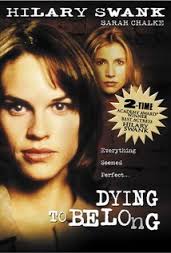
DYING TO BELONG
US, 1996, 85 minutes, Colour.
Hilary Swank, Jennifer Warren.
Directed by William A. Graham.
Dying to Belong is a short telemovie about a girls' sorority. It resembles such films about male bonding as The Lords of Discipline and Skulls.
The film is fairly straightforward, even predictable, with strong-minded Hilary Swank coming to the university urged by her mother to join the sorority that she belonged to. Her mother dominates her life and her daughter is reacting against this while still trying to please her. She encounters a young student who is eager to join the sorority and earn the sisterhood award. Urged by the callous members of the sorority, who seem to depend on a sense of unity, community and commitment (their credo), the young woman falls to her death. In the meantime, the heroine has joined the local newspaper, fallen in love with one of the reporters. Together, they expose the hazing.
The film is of special interest in seeing Hilary Swank, four years before she won her Oscar for Boys Don't Cry. She also appeared after her Oscar in The Gift and The Affair of the Necklace.
1. Interesting and entertaining telemovie? A piece of Americana? American universities, sororities, hazing?
2. The university campus, administration, lecture rooms, the dormitories, the rooms? Authentic atmosphere?
3. The title, the irony for Shelby? The prologue, the young woman abducted by the members of the sorority, being thrown out of the car, not having her medicine, the headlights advancing? The assumption that she died? Steven making this assumption? Her later becoming part of the testimony against the sorority?
4. The role of sororities, the bonding with the women, the tests for belonging, the votes, the motivations, the meanness, the support? The belief in community, the old-fashioned rituals and commitment, blood oaths and vows? The hoods and capes, the candles? The trappings of old-time religion? In the modern era? The secrecy, the domination? The wanting to belong?
5. Lisa, her mother and her dominance, the absent father? Arrival on campus, meeting Shelby, their ruse to get the room together? Lectures? Going to the paper, her self-assertiveness, the encounter with Steven? His going out with her, the lecture by Carl Bernstein - and his not mentioning Woodward? Her writing? The interviews for the sororities, the vote for Pi Gamma, their pretending that she was not accepted? She and Shelby accepted? The rituals? The hazing, standing on the table and being ridiculed? Eating eggshells and glass? Shelby on the roof? The closeness - and Lisa's reacting against this? Seeing the girls were not her friends, her phone calls to her mother, her reaction to Shelby's death? The investigations, the police, the dean? The threats, her being abducted and left in the snow? Her mother believing her? The meeting with the two girls, the tape of Anne- Marie and Steven and Lisa visiting her? Kim and her confession, Dreya and her admitting what had happened? Her future at the university, at the paper, with Steven, with her mother?
6. Shelby, eager to please, befriending Lisa, her growing earnestness, the interviews, praising what the girl wore and being brought into the group? The hazing, on the roof, her death?
7. The girls, their callousness, sense of superiority, cruelty? Lies in the name of protecting the group, protecting Lisa, saying that Shelby measured everything against Lisa's standards? The final confession?
8. Steven, attracted to Lisa, going out together, his preaching at her, her clash with him? The investigation, with Anne-Marie?, being sacked from the paper?
9. The administrators, the dean, denial of hazing? The interviews, the cover-up? The final press conference and reform? The role of the police, investigations?
10. An interesting melodrama, tackling university life and the role of sororities?
Published in Movie Reviews
Published in
Movie Reviews
Tagged under
Saturday, 18 September 2021 19:33
Devil's Prey

DEVIL'S PREY
US, 2001, 87 minutes, Colour.
Patrick Bergen, Charlie O' Connell, Ashley Jones, Alina Lyons, Bryan Kirkwood, Jennifer Lyons.
Directed by Bradford May.
Devil's Prey is standard devil-worship in the Midwest fare. The film focuses on young people, their recklessness, their being caught up in a diabolical cult, the violence the experience, human sacrifice _
The film moves between the extroverted life of the young people to the church where the Satanists hold their sacrifices. There are heroics, betrayals, violent deaths. This is standard material of this kind of melodrama.
1. The appeal of this kind of story? Satanism and devil-worship? In the American Midwest? The credibility of this kind of behaviour, of the plot?
2. The title, the focus on Satan, the Devil? The ritual of devil-worship, the church, the inverted crucifixes, the altar, candles, human sacrifice? The renegade priest? The worshippers, their forming part of a cult, being brainwashed? The security in this kind of community? The aberrations, the violence?
3. The focus on the young group, together at the club, drug-dealing, work, good time? The invitation to the party? The drive, hitting Fawn? The party and their being caught up in the Satanist plots? The victims?
4. The priest, his seeming friendliness, evil, conducting of the rituals, his power of persuasion?
5. The characters in the group, typical of this kind of film - differentiated characters or not? Their behaviour, their fears, hiding, fleeing, the house, the Satanists pursuing them? Torture and death? Sacrifice?
6. The finale, the confrontation of good and evil, heroism, the defeat of evil and the prevailing of good?
Published in Movie Reviews
Published in
Movie Reviews
Tagged under
Saturday, 18 September 2021 19:33
Dead Man's Island/ 1996
DEAD MAN'S ISLAND
US, 1996, 85 minutes, Colour.
Barbara Eden, William Shatner, Christopher Atkins,
Morgan Fairchild, Roddy McDowell?, Traci Lords, Jameson Parker, Olivia Hussey, Christopher Cazenove.
Directed by Peter Hunt.
Dead Man's Island is a plush, modern version of a very (very) old story: a group of people assembled on an island where there is a threat of murder. The boat is destroyed, they cannot escape, a storm rises and destroys the house and the victim is killed.
The film was done in the popular CBS American telemovie style, a cast of veteran (old) television stars. The audience might be able to see where the twist will be - there are some clues but, again, at the end the central character, this time a Pulitzer Prize-winning investigative reporter, played by Barbara Eden, explains whodunnit and why.
1. Popular telemovie? Popular story, the isolated island, the group on the
island, the murder threats, the clashes, the clues, the resolution?
2. The island itself, the mansion, the old Indian and his explanation of the curses, the arrogance of the Prescott family building the house?
3. The cast and their background on screen and, especially, on television?
4. Barbara Eden as Henry O., investigative journalist, her voice-over explaining things, her good ol' Southern accent? The fear in Prescott's voice, the talk with the Indian, her determination, not wanting to be dominated, meeting the group, interactions, the meal, the shots and murder threats, the discussions with Prescott, the deaths, her pretending that Burton was still alive, the unmasking of the killer, the truth?
5. Prescott, his arrogance, domination, relationship with Henry O., gathering everybody to the island, his explanation of why they were there, the poison in the chocolates? His empire, its moving towards insolvency? His young wife, relationship with Valerie, with the financiers, his son and stepson? His arrogance, his death? The revelation of the truth?
6. Roger and his stepbrother, their role, potential suspects? Miranda, her age, relationship with Prescott, her attempted suicide, revival, her muttering about his love for her and lack of it, her knowing the truth?
7. Valerie, the glamorous actress and her relationship? Lyle, Trevor and the financial and legal aspects of the company? Trevor and his overhearing the truth, attacking Burton, being shot?
8. Burton, his place in the household, his knowing the truth, wanting to reveal it, the discussions with Trevor, Trevor killing him?
9. Rosie and Milo, the domestic staff - suspicions or not? Their role in the saga, Milo shooting Trevor?
10. The storm, the rescue, the neat ending? The perennial popularity of this kind of murder mystery?
US, 1996, 85 minutes, Colour.
Barbara Eden, William Shatner, Christopher Atkins,
Morgan Fairchild, Roddy McDowell?, Traci Lords, Jameson Parker, Olivia Hussey, Christopher Cazenove.
Directed by Peter Hunt.
Dead Man's Island is a plush, modern version of a very (very) old story: a group of people assembled on an island where there is a threat of murder. The boat is destroyed, they cannot escape, a storm rises and destroys the house and the victim is killed.
The film was done in the popular CBS American telemovie style, a cast of veteran (old) television stars. The audience might be able to see where the twist will be - there are some clues but, again, at the end the central character, this time a Pulitzer Prize-winning investigative reporter, played by Barbara Eden, explains whodunnit and why.
1. Popular telemovie? Popular story, the isolated island, the group on the
island, the murder threats, the clashes, the clues, the resolution?
2. The island itself, the mansion, the old Indian and his explanation of the curses, the arrogance of the Prescott family building the house?
3. The cast and their background on screen and, especially, on television?
4. Barbara Eden as Henry O., investigative journalist, her voice-over explaining things, her good ol' Southern accent? The fear in Prescott's voice, the talk with the Indian, her determination, not wanting to be dominated, meeting the group, interactions, the meal, the shots and murder threats, the discussions with Prescott, the deaths, her pretending that Burton was still alive, the unmasking of the killer, the truth?
5. Prescott, his arrogance, domination, relationship with Henry O., gathering everybody to the island, his explanation of why they were there, the poison in the chocolates? His empire, its moving towards insolvency? His young wife, relationship with Valerie, with the financiers, his son and stepson? His arrogance, his death? The revelation of the truth?
6. Roger and his stepbrother, their role, potential suspects? Miranda, her age, relationship with Prescott, her attempted suicide, revival, her muttering about his love for her and lack of it, her knowing the truth?
7. Valerie, the glamorous actress and her relationship? Lyle, Trevor and the financial and legal aspects of the company? Trevor and his overhearing the truth, attacking Burton, being shot?
8. Burton, his place in the household, his knowing the truth, wanting to reveal it, the discussions with Trevor, Trevor killing him?
9. Rosie and Milo, the domestic staff - suspicions or not? Their role in the saga, Milo shooting Trevor?
10. The storm, the rescue, the neat ending? The perennial popularity of this kind of murder mystery?
Published in Movie Reviews
Published in
Movie Reviews
Tagged under
Saturday, 18 September 2021 19:33
Da
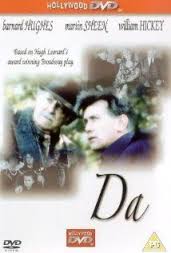
DA
US, 1988, 102 minutes, Colour.
Barnard Hughes, Martin Sheen, William Hickey, Hugh O'Conor.
Directed by Matt Clark.
Da is Barnard Hughes as the strong, weak, endearing, cantankerous old Irish dad. Playwright Hugh Leonard has adapted his autobiographical drama for the screen with Hughes repeating his Tony-winning performance. It has been beautifully filmed in Ireland. In fact, in the town and house where the events occurred.
Martin Sheen is the playwright who returns from the U.S. for his Da's funeral. He reminisces, talking, arguing, and comes to terms with his understanding of and love for his father who appears round the house and town. He is also able to see his younger self.
This might make the film sound more sombre than it actually is. Rather, it is full of sentiment, humour, wisdom and the atmosphere of Ireland.
1. The appeal of the film? Portrait of human beings? Irish atmosphere and Irish individuals? Universal appeal?
2. The work of Hugh Leonard, autobiographical play, adapting it for the screen, the feeling within it?
3. The Irish settings and their authenticity, the town, the house, the sea? Past and present? Visual impact, moods? The musical score?
4. The use of language, the Irish lilt of the English, idiomatic expressions and metaphors? Language and character?
5. The structure of the film: Charlie, his nervousness, the play, his family, the phone call?
6. The build-up to the funeral, the feeling at the funeral, memories of Da, the mourners, the range of comments - feeling, irony?
7. Charlie and the effect of going back to Ireland, the funeral? His dialogue? Da appearing in the house? Their talking and arguing together, the quality of their relationship, love and dislike, hard and soft, proud, profane, religious themes, the house in the street, the park, the coast and the view, the wharf, the girl? Their sharing places?
8. Past times: Charlie seeing his younger self, 18 and later, dialoguing with himself and the revelation about his youth, changes, his career? His expressions of hopes, sexual relationships, friends, working for
Mr Drum, his working and drudgery?
9. Da and Mother, the loving relationship, tough? Religion? Her story of his courting her and marrying her, the arranged marriage? His memory, the proposal to her father? The adoption? The harshness of Da, the dog and the barking, taking the dog to be drowned? The scene with the girl, sex, seeing her as a person? Oliver and friendships? Past and present? Mr Drum, the arranging of the job? Becoming his protege? The avoiding in the street? Leaving for marriage?
10. Barnard Hughes as Da: in himself, work, poor, ignorant, bullied, pigheaded, his sympathetic words for Hitler, religious attitudes, his ageing, senility, money?
11. Mr Drum and the interview, the Nazi sentiments, taking Charlie to work, the job, his being hurt, respects and the money, the legacy?
12. The sketch of the girl, Oliver and the cafe boards?
13. Charlie and his experience in Ireland, going back over the past, facing his father, freedom?
14. The United States and Da in the United States? The contrast of the American culture and the Irish?
15. Local colour, comic highlights, the detail in the characterisations? The Irish tone yet the universal themes?
Published in Movie Reviews
Published in
Movie Reviews
Tagged under
Saturday, 18 September 2021 19:33
Downpayment on Murder
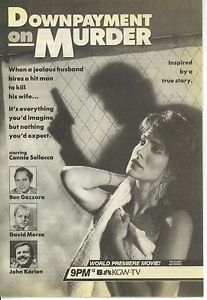
DOWNPAYMENT ON MURDER
US, 1987, 95 minutes, Colour.
Ben Gazzara, Connie Selecca, David Morse, Jonathan Banks, G.W.Bailey.
Directed by Waris Hussein.
Downpayment on Murder is a thriller about a strange marriage relationship, an obsessive husband, a persecuted wife, the husband's hiring of an assassin to murder his wife - and the audience being led to believe at the opening of the film that she was dead.
Connie Selecca (Hotel) gives a good performance as the wife who loves her husband, is mystified by his behaviour, separates and takes the children away from him and can scarcely believe his violent and murderous attitude towards her. Ben Gazzara uses his sinister style as the menacing and violent husband. The film has an interesting supporting cast including G.W. Bailey (from the Police Academy series) as the assassin - who turns out to be a policeman.
The film is conventional enough in its telemovie style - however, there are some twists which keep audience attention. The film ends more as a melodrama rather than as a violent domestic drama.
1. Interesting and entertaining telemovie? Conflicts in marriage? The resort to violence? Based on a true story?
2. The American settings, the city, the family? Ordinariness? The more sinister side? Musical score?
3. The opening, Karen dead, the true story, the flashbacks? The portrait of Karen, her work, relationship with her children? Friendship with Donna? Love for Harry, marrying him? Harry's daughter and her punk friends, the clashes? Harry giving them money? Financial difficulties? The alienation from Harry? Leaving, the children, his violence? Her house being broken into? Her friendship with the agents, their helping her earlier? The information about the murder attempt? Albert and his concern for her? The threats, her disbelief? The plan for the night, her being alone, the murderer? Her being at the morgue? The irony of the plan, her surviving - and her look at Harry as he was led away? Portrait of a terrorised wife? Bewildered in the breakdown of her marriage? Care for her children?
4. Harry, ordinary, enigmatic? Money deals? His daughter, her friends? Wanting financial support from Karen? The clashes, his violent outbursts? Brutality? The separation, his pleading, intrusion? His deviousness, the talk with Albert and ingratiating himself? The plan for the murder? The money, the discussion with the killer? Their clashes? The pressure? The fulfilling of the contract? His being taped, arrested after the visit to the morgue and his identification of his wife? The irony of his arrest, the possibility of parole? A strange character?
5. Albert, friendly, the caretaker, concern for Karen and the children? Talking with Harry, the beers, talking about criminals? The set-up, the assassin? The revelation that Albert had not betrayed Karen? The assassin, his background, sinister, stalking Karen - and the irony of his being a police officer?
6. Donna, work, friendship with Karen, helping her out, party to the plan?
7. The agents, the insensitive agent and his statements, his partner and his tact? Their investigations, clashes with Harry, helping Karen move? Bodyguards? The news about the assassin? Their participation in the plan and its successful execution?
8. The true story drama, tensions in families? The melodrama with the assassin, the twist of the plot, the faked death and the arrest? Designed for the television audience?
Published in Movie Reviews
Published in
Movie Reviews
Tagged under
Saturday, 18 September 2021 19:33
Dust Be My Destiny
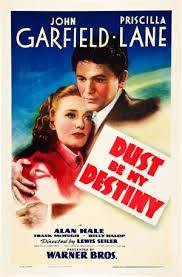
DUST BE MY DESTINY
US, 1939, 88 minutes, Black and white.
John Garfield, Priscilla Lane, Alan Hale, Frank Mc Hugh, John Litel, Charles Grapewin.
Directed by Lewis Seiler.
Dust Be My Destiny is quite an effective action thriller of the late '30s. However, it is a film of human interest. John Garfield, quite effectively, portrays a young man falsely incriminated and with a heavy chip on his shoulder. However, he experiences some kindness and gets the opportunity to experience American justice and to begin a new life. Priscilla Lane is the heroine.
The screenplay was written by Robert Rossen (later to write and direct many films including All The King's Men and directing Garfield in Body and Soul). The film has the usual Warner Bros production values - but is a strong message film of hope for ordinary citizens in the '30s.
1. A thriller of the '30s, ordinary people, opportunities, the aftermath of the depression?
2. Warner Bros production values, black and white photography, middle America, prison, on the road, the cities? Musical score by Max Steiner incorporating popular songs including `My Wild Irish Rose'?
3. The title, the human condition, hope? Strong message: ordinary people, victims, chip on the shoulder, opportunities, kindnesses and fate, justice and the United States?
4. John Garfield's portrait of Joe: wrongfully imprisoned, being let out, hopping the freight train, meeting the boys, the kindness of Pop letting them stay, the criminals and the arrest, the courtroom and his back-answering, 90 days, the work, the rock detail, milking the cow on the wrong side, the encounters with Mabel and his antagonism? The privileges and driving a truck, meeting Pop again, the truth about Mabel? In love with her, the arrival of the stepfather, the fight, the death and running away?
5. Mabel, her stepfather, with the prisoners, liking Joe, their clashes, the cow, helping him with the warden, falling in love, the stepfather's severity, running with Joe?
6. On the run, hitch-hiking, hungry? Nick and his giving them a job, friendship? The police, the arrest of Mabel? Joe as the photographer, persuading the warder, the help of Nick, getting Mabel out of jail? On the road, the hitch-hiking, Mabel wanting to give in, taking the truck, staying and the reconciliation with Joe? His wanting to do a robbery, the kind lady in the shop, his inability to rob? The return and the reconciliation?
7. Joe taking the photo, the owner of the pawn shop, taking the photos of the robbery, meeting Mike Leonard, the sensation, the criminals with Mike and Joe helping, in hospital, Mabel telling the truth and his bitterness?
8. The court proceedings, the prosecutor and twisting the words of the witnesses, the character witnesses, the evidence for Joe? His bitterness? Mabel, her speech, compassion, the defender's plea? Not guilty?
9. The strength of the speeches - Mabel and her assessment of the situation, justice? The prosecutor and the appeal for the ordinary citizen?
10. The people who were kind, Pop, Mabel, Nick, the lady in the shop, Mike?
11. The blend of tough thriller with humane story?
Published in Movie Reviews
Published in
Movie Reviews
Tagged under
Saturday, 18 September 2021 19:33
Dunston Checks In
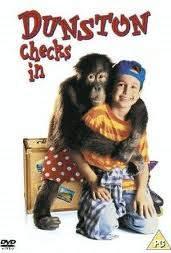
DUNSTON CHECKS IN
Canada, 1996, 88 minutes, Colour.
Jason Alexander, Faye Dunaway, Rupert Everett, Paul Reubens.
Directed by Ken Kwapis.
On paper, Dunston Checks In seems fairly silly. It is about an English peer who uses an orang-utan as his assistant to rob fashionable hotels in New York City. However, in the execution, it is very funny and enjoyable. Jason Alexander does his usual comic role as the maitre d' of the hotel. Rupert Everett does his usual upper-class English toff as the burglar. Faye Dunaway also appears - and seems to enjoy the comedy, even when she has to land in a huge cake. It's that kind of film - but much more enjoyable than expected.
1. A film for children? Adults? Families? Entertaining films about children and animals?
2. The slapstick comedy with Dunston? With the human characters? The verbal and visual humour? Parody?
3. The atmosphere of the hotel, its luxury, its rooms, ballroom, the background of the laundry and the various chutes? The New York atmosphere and affluence? Its style? The strong cast? Musical score?
4. Jason Alexander as Robert Grant, his style as the maitre d? Meticulous, obsequious to the guests, his relationship with Mrs Dubrow? Everything going smoothly in the hotel? The sequences of his attention to detail? His relationship with his sons? Their mother's death? Their activities in the hotel, getting into trouble, his having to rescue them? The sequence with the opera singer and with Mr Spalding? Ultimately in the fountain? Taking Mr Spalding's dog for a walk - and its falling from the roof? His continually having to make apologies?
5. Faye Dunaway and her imperious style with glamour as Mrs Dubrow, her elderly husband in tow? Her management of the hotel, her dominance, her treatment of the staff, sacking them and their leaving in tears? Her ordering Robert around? Her hopes for the success of the hotel, the judge for the competition and her desire for the five stars? Her gush and her glitz?
6. The contrast with Kyle and Brian and their activities around the hotel? Looking at Lord Rutledge's trunk, the discovery of Dunston, Lord Rutledge's treatment of Dunston? Their not liking him? The set-up for disasters to follow?
7. Dunston and his brother, Lord Rutledge and his circus background, the cruelty to Dunston and his brother? Lord Rutledge and his control, the robberies? Dustan’s escape? Kyle and Brian finding him, filming him, telling their father, not being believed?
8. Lord Rutledge and his phoney identity, his pretentious manner, mixing with people, the robberies, his cruelty to Dunston and his control? The confrontations at the end? The ballroom and Dustan’s leading to Lord Rutledge's downfall?
9. Dunston and his careering about the hotel? At Robert's meeting? People being upset - and the consequent comedy? His going round the hotel, the wealthy lady, the gym and the massage?
10. Lord Rutledge and the search for Dunston? The hiring of the exterminator - the intensity of his quest? Causing mayhem? Firing the darts - and hitting Mr Spalding?
11. The ball and the dinner? Mrs Dubrow and her husband? Her dress, make-up, the huge cake? Her mistaking Lord Rutledge as the judge? Her spurning of Spalding? Dunston and his attack on her - and her falling twice into the cake? Mr Spalding and the cake? The complete mess?
12. The humour of Robert and his children being transferred to Bali and managing the hotel? The boys finally getting their holiday? Dunston and his behaviour in Bali? Mr Spalding?
13. Characters and caricatures - for an entertaining comedy?
Published in Movie Reviews
Published in
Movie Reviews
Tagged under
Saturday, 18 September 2021 19:33
Duel of Hearts
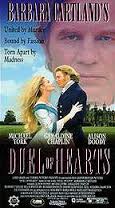
DUEL OF HEARTS
UK, 1990, 95 minutes, Colour.
Allison Doody, Michael York, Geraldine Chaplin, Susanna Hamilton, Benedict Taylor, Billie Whitelaw.
Directed by John Hough.
Duel of Hearts is a lavish telemovie version of a Barbara Cartland historical novel. It is all stops out, beautiful British locations, costumes and decor, highly emotive dialogue, melodramatic situations full of lust and revenge. However, it is all presented on a very elegant surface level. The film was made as a Gainsborough film - with tribute to and echoes of so many of the costume melodramas from that studio in the '40s (Fanny by Gaslight, Man in Grey, Wicked Lady).
The film has a strong British cast led by Michael York and Geraldine Chaplin as villains, with Alison Doody (Indiana Jones and the Last Crusade) as the heroine. There is quite a strong supporting cast with cameo roles including Beryl Reed, Richard Johnson, Jeremy Kemp, Virginia McKenna?.
The plot is highly implausible in the way that it is presented, but that is part of the charm. The audience knows what to expect - and they are not disappointed. Direction is by John Hough, best known as a director of horror and action films.
1. Entertaining period melodrama? Barbara Cartland novels? Transferred with lavish style to the screen?
2. Period, country locations, the British countryside? Decor and costumes? Manners? The musical score?
3. The title - for an emotional and violent romance?
4. Lady Caroline, her place in British society, the season in the country, the entanglements with the young men, the rake and his deceiving her and compromising her? Her wanting to escape her chaperone? The encounter in the forest with Gervais, with Vane? Her decision to go to her father and cover the truth? Listening to the stories about Vane? Deciding to pretend to be a companion for his mother? The interviews, her employment? The housekeeper, the clash with Mrs Miller? Getting on well with the mother? Her meeting with Vane? Her warnings? Her staying with Harriet and her father? Her concern about Harriet's marriage? Intrigues in the house, finding the mad sister and the attack, the rescue by the housekeeper? Concealing her reputation? Banquets, dinners? The threatened exposure by Gervais? The violence, the ride to London, the clash with Gervais, the rescue of Vane? The happy ending?
5. Vane, his being abroad, his deep dark secret, the dead man in the forest, the encounter with Caroline? Clash with Gervais? Love for his mother? Brooding in the house? The attachment to the gypsies? His love for Caroline? Overhearing the blackmail? His disappointment, the going to London? The rescue and fight? Jervois’s death? The surprising news that he was not tainted with madness? The happy ending?
6. Gervais, the older cousin, intrigue, arranging murders? Wanting to borrow money? A cad? His affair with Mrs Miller? Threatening to blackmail Caroline? The clash with his cousin, the ride to London, the gypsies, the fight, his death and the irony that he was the heir? Mrs Miller, her place in the household, her affair with Gervais, intrigues and dominance? The failure of her plot?
7. Harriet and her father, the arrogant rector, his quoting scripture, dominating his daughter? Harriet, her friendship with Caroline, meeting the peer, thinking he was poor, eloping to marry him?
8. The hero's mother, her retirement, dominated by Mrs Miller, standing her ground? Reliance on the housekeeper and her sympathies? The sister hidden in the mansion, her murderous attitudes? Death? The revealing of the secrets?
9. The English aristocracy, Caroline's father and his household, his guest and friendship? The contrast with the hero's aunt and her drinking? The young men about town and in the country? Manners and morals?
10. The popularity - and unreality - of this kind of period melodrama?
Published in Movie Reviews
Published in
Movie Reviews
Tagged under
Saturday, 18 September 2021 19:33
Duck Tales The Movie, Treasure of the Lost Lamp
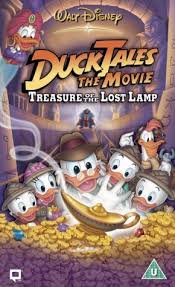
DUCK TALES THE MOVIE, TREASURE OF THE LOST LAMP
US, 1990, 74 minutes, Colour.
Voices of Alan Young, Christopher Lloyd, Richard Libertini.
Directed by Bob Hathcock.
Duck Tales The Movie, Treasure of the Lost Lamp, is an attempt at the end of the '80s by the Disney Studios to revive the popular cartoons with such characters as Donald Duck, Mickey Mouse with their emphasis on verbal humour and slapstick.
The opening of the film is obviously a play on the Indiana Jones stories. When Uncle Scrooge and the family move back to Duckburg (New York), the film is a variation on Aladdin and his lamp, genie and all.
The film is done in the familiar style of the old cartoons with the contemporary sophistication. The actors contributing their voice talents are very good: Alan Young as Scrooge, Richard Libertini as the servant, Christopher Lloyd as the villain.
The film is brief, designed for the younger audiences - and an amusing feature-length old-style cartoon.
1. Enjoyable Disney cartoon? The traditions of Donald Duck and Mickey Mouse? A '90s version?
2. The quality of the animation, the drawing, the action? Layouts? Humour? Slapstick? Verbal jokes?
3. The contribution of the voices and their styles, characters, comedy?
4. The influence of Indiana Jones stories? Aladdin and his lamp?
5. The opening adventure - Launch Pad and his dangerous flying, the collapse of the monuments? Scrooge and his nephews, and Webby? Their search? Digging out the pyramid? Being watched by Merlock? Dijon as the servant? The discovery of the treasure - and the Indiana Jones adventures: traps, dangers, scorpions, bridges etc? Merlock and his pursuit? Dijon and the money? Their losing the money, Webby with the lamp? Scrooge and his enterprise - with the touch of scrooginess about money? Huey, Dewey and Louey in the comic tradition? The return to Duckburg? Discovering the genie? The possibility of having all wishes fulfilled - children style? Scrooge and his life back in Duckburg, his reputation? The pursuit of Merlock, Dijon? Getting of the lamp? The genie and his emergence, the children hiding him? His wanting to be a normal duck? The comeuppance of Merlock and Dijon and happy ever after?
6. The presentation of the action adventures in the style of Indiana Jones in the'80s?
7. Merlock as villain, changing shapes, hold over Dijon, the dangers? Menace in the city? The traditional villain?
8. Dijon, the servant, his fears, greed, wheedling? His gaining the lamp and control? Always a thief?
9. Popular animation, popular characters - designed for a young audience?
Published in Movie Reviews
Published in
Movie Reviews
Tagged under